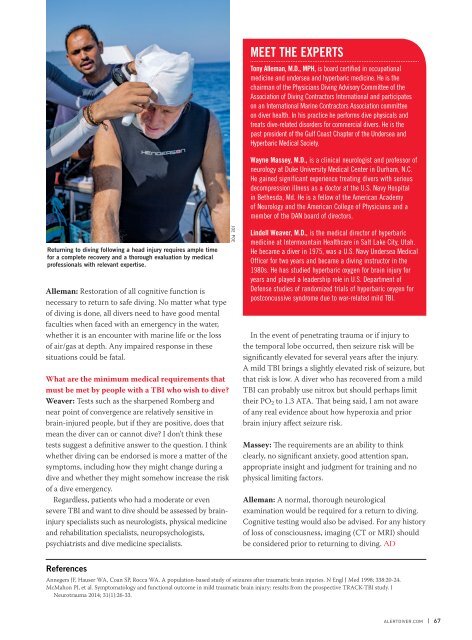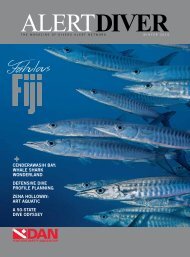AD 2017 Q1
Alert Diver is the dive industry’s leading publication. Featuring DAN’s core content of dive safety, research, education and medical information, each issue is a must-read reference, archived and shared by passionate scuba enthusiasts. In addition, Alert Diver showcases fascinating dive destinations and marine environmental topics through images from the world’s greatest underwater photographers and stories from the most experienced and eloquent dive journalists in the business.
Alert Diver is the dive industry’s leading publication. Featuring DAN’s core content of dive safety, research, education and medical information, each issue is a must-read reference, archived and shared by passionate scuba enthusiasts. In addition, Alert Diver showcases fascinating dive destinations and marine environmental topics through images from the world’s greatest underwater photographers and stories from the most experienced and eloquent dive journalists in the business.
You also want an ePaper? Increase the reach of your titles
YUMPU automatically turns print PDFs into web optimized ePapers that Google loves.
Returning to diving following a head injury requires ample time<br />
for a complete recovery and a thorough evaluation by medical<br />
professionals with relevant expertise.<br />
Alleman: Restoration of all cognitive function is<br />
necessary to return to safe diving. No matter what type<br />
of diving is done, all divers need to have good mental<br />
faculties when faced with an emergency in the water,<br />
whether it is an encounter with marine life or the loss<br />
of air/gas at depth. Any impaired response in these<br />
situations could be fatal.<br />
What are the minimum medical requirements that<br />
must be met by people with a TBI who wish to dive?<br />
Weaver: Tests such as the sharpened Romberg and<br />
near point of convergence are relatively sensitive in<br />
brain-injured people, but if they are positive, does that<br />
mean the diver can or cannot dive? I don’t think these<br />
tests suggest a definitive answer to the question. I think<br />
whether diving can be endorsed is more a matter of the<br />
symptoms, including how they might change during a<br />
dive and whether they might somehow increase the risk<br />
of a dive emergency.<br />
Regardless, patients who had a moderate or even<br />
severe TBI and want to dive should be assessed by braininjury<br />
specialists such as neurologists, physical medicine<br />
and rehabilitation specialists, neuropsychologists,<br />
psychiatrists and dive medicine specialists.<br />
JOE POE<br />
MEET THE EXPERTS<br />
Tony Alleman, M.D., MPH, is board certified in occupational<br />
medicine and undersea and hyperbaric medicine. He is the<br />
chairman of the Physicians Diving Advisory Committee of the<br />
Association of Diving Contractors International and participates<br />
on an International Marine Contractors Association committee<br />
on diver health. In his practice he performs dive physicals and<br />
treats dive-related disorders for commercial divers. He is the<br />
past president of the Gulf Coast Chapter of the Undersea and<br />
Hyperbaric Medical Society.<br />
Wayne Massey, M.D., is a clinical neurologist and professor of<br />
neurology at Duke University Medical Center in Durham, N.C.<br />
He gained significant experience treating divers with serious<br />
decompression illness as a doctor at the U.S. Navy Hospital<br />
in Bethesda, Md. He is a fellow of the American Academy<br />
of Neurology and the American College of Physicians and a<br />
member of the DAN board of directors.<br />
Lindell Weaver, M.D., is the medical director of hyperbaric<br />
medicine at Intermountain Healthcare in Salt Lake City, Utah.<br />
He became a diver in 1975, was a U.S. Navy Undersea Medical<br />
Officer for two years and became a diving instructor in the<br />
1980s. He has studied hyperbaric oxygen for brain injury for<br />
years and played a leadership role in U.S. Department of<br />
Defense studies of randomized trials of hyperbaric oxygen for<br />
postconcussive syndrome due to war-related mild TBI.<br />
In the event of penetrating trauma or if injury to<br />
the temporal lobe occurred, then seizure risk will be<br />
significantly elevated for several years after the injury.<br />
A mild TBI brings a slightly elevated risk of seizure, but<br />
that risk is low. A diver who has recovered from a mild<br />
TBI can probably use nitrox but should perhaps limit<br />
their PO 2 to 1.3 ATA. That being said, I am not aware<br />
of any real evidence about how hyperoxia and prior<br />
brain injury affect seizure risk.<br />
Massey: The requirements are an ability to think<br />
clearly, no significant anxiety, good attention span,<br />
appropriate insight and judgment for training and no<br />
physical limiting factors.<br />
Alleman: A normal, thorough neurological<br />
examination would be required for a return to diving.<br />
Cognitive testing would also be advised. For any history<br />
of loss of consciousness, imaging (CT or MRI) should<br />
be considered prior to returning to diving. <strong>AD</strong><br />
References<br />
Annegers JF, Hauser WA, Coan SP, Rocca WA. A population-based study of seizures after traumatic brain injuries. N Engl J Med 1998; 338:20-24.<br />
McMahon PJ, et al. Symptomatology and functional outcome in mild traumatic brain injury: results from the prospective TRACK-TBI study. J<br />
Neurotrauma 2014; 31(1):26-33.<br />
ALERTDIVER.COM | 67









